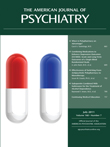To the Editor: Drs. Dhossche, Fink, Shorter, and Wachtel question whether the case of a 16-year-old boy with acute neuropsychiatric disintegration represents anti-NMDA receptor encephalitis or pediatric catatonia. A more appropriate formulation might be that of anti-NMDA receptor encephalitis and pediatric catatonia.
In the case presented, anti-NMDA receptor encephalitis was confirmed with the identification of antibodies to the NR1/NR2 subunits of the NMDA receptor in the patient's serum and CSF. As such, the available literature indicated response to a number of immunotherapies, and these were subsequently introduced in the management of this case. While the patient did not respond to corticosteroids, he did experience symptom amelioration first with intravenous immunoglobulin and later rituximab.
Clinical symptoms of catatonia, including excessive motor activity, agitation, aggression, negativism, and mutism, presented at various times for various durations throughout the illness course. A “benzodiazepine challenge test,” proposed as a diagnostic assessment tool and a known beneficial treatment in catatonia, resulted in decreased irritability and marginally improved sleep but did not have the immediate and marked effect that would have warranted continued administration at higher doses and more frequent intervals. Because the patient did experience some benefit, 1 mg of lorazepam every 8 hours was continued for a brief period. Much remains to be learned about the symptomatic management of catatonia and other psychiatric manifestations associated with autoimmune encephalitis. Cases such as the one presented here are often protracted, with a number of interventions during the treatment course, making it difficult to establish the effectiveness of any one treatment. Other contributing factors may include the natural course of the illness, the potential for relapse, and evidence that suggests that complete recovery is achieved only with resolution of the underlying immune-mediated process.
ECT has been used on a limited basis in the management of patients with autoimmune encephalitis. As with other therapeutic modalities, direct causality between this treatment intervention and recovery has yet to be established. A majority of the cases in which ECT was used document full recovery only after the underlying disease process was ameliorated, often through tumor removal (
1–
3). In the case presented here, ECT was not considered as part of the overall management plan for a number of reasons that were both practical and preferential. Colorado, like many other states, has very specific laws regarding the use of ECT, particularly in patients under 18 years old. Colorado Revised Statute 13-20-403 states that under no circumstances shall electroconvulsive treatment be performed on a minor under 16 years old, and while ECT may be performed on adolescents 16–18 years old, two licensed psychiatrists must agree with the treatment plan and a parent or guardian must provide consent. Regardless, most facilities that perform ECT in Colorado elect not to perform this procedure on minors. In this case, the patient's parents were focused on the underlying medical diagnosis; they resented somewhat the fact that their son was being treated on a psychiatric unit; and they hesitated to provide consent for psychotropic medication interventions, preferring first to pursue immune therapies that had demonstrated effectiveness in other cases.
This young man presented with a catatonic disorder as a result of anti-NMDA receptor encephalitis. Aggressive management of the observable symptoms of catatonia due to a general medical condition does not preclude appropriate treatment of the underlying disease process, particularly when, as is the case with the autoimmune encephalitides, the most profound improvements in psychiatric and behavioral symptoms occur when the antibody response is suppressed or reversed.
Studies comparing the impact of immune therapies with symptomatic treatments including psychotropic medications and ECT in anti-NMDA receptor encephalitis are needed to inform the best possible management of these patients.

